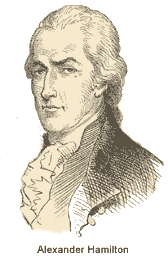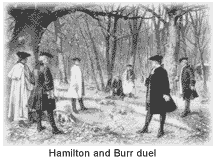Alexander Hamilton was born on January 11, 1755, on the island of Nevis in the West Indies. His Scottish father and French mother were not married. Early in life he showed great intellectual potential and was sent to New York City for schooling by a sympathetic clergyman. Hamilton completed his basic schooling and was later admitted to King`s College, now Columbia University. Patriotic fervor was at its height during the 1770s and young Hamilton impressed many with speeches and pamphlets.
 During the War of Independence, following the battles of Lexington and Concord, Hamilton organized an artillery company and saw action at New York, Long Island, Trenton, Princeton, and White Plains. His abilities were soon recognized by George Washington, who appointed Hamilton as one of his aides-de-camp. Toward the end of the war, Hamilton resigned from that post to resume active participation in the conflict. He served with distinction at Yorktown, in 1781.
During the War of Independence, following the battles of Lexington and Concord, Hamilton organized an artillery company and saw action at New York, Long Island, Trenton, Princeton, and White Plains. His abilities were soon recognized by George Washington, who appointed Hamilton as one of his aides-de-camp. Toward the end of the war, Hamilton resigned from that post to resume active participation in the conflict. He served with distinction at Yorktown, in 1781.
During the war, Hamilton displayed his willingness to break with orthodox thinking. In a letter in 1779 to John Jay, he expressed concern that the state of Georgia and South Carolina were threatened with a Loyalist victory, and that in response the Continental Army should actively induce black slaves to join the army, with the prospect of freedom after the war. "I have not the least doubt," he wrote, "that the Negroes will make very excellent soldiers, with proper management." Following the war, Hamilton studied law and married Elizabeth Schuyler, daughter of General Philip J. Schuyler, head of a prominent New York family. The Hamiltons had eight children.
In 1782-83, Hamilton served in the Articles of Confederation Congress and later developed a successful law practice. In 1784, using the pen name "Phocion", Hamitlon wrote a series of newspaper articles calling on fair treatment for Loyalists who had remained in America. He pointed out possible consequences:
Nothing is more common than for a free people, in times of heat and violence, to gratify momentary passions, by letting into the government, principles and precedents which afterwards prove fatal to themselves. Of this kind is the doctrine of disqualification, disfranchisement and banishment by acts of legislature. The dangerous consequences of this power are manifest. If the legislature can disfranchise any number of citizens at pleasure by general descriptions, it may soon confide all the votes to a small number of partizens, and establish an aristocracy or an oligarchy; if it may banish at discretion all those whom particular circumstances render obnoxious, without hearing or trial, no man can be safe, nor know when he may be the innocent victim of a prevailing faction. The name of liberty applied to such a government would be a mockery of common sense.In 1786, at the Annapolis Convention, he proposed a future meeting to address the problems of the Articles of Confederation. That gathering was the Constitutional Convention in which Hamilton played a prominent role as an advocate of a strong central government. He presented a plan that called for life terms for senators and the executive.
Although the final constitution fell short of Hamilton`s hopes, he actively supported ratification in his home state. The New York convention was initially heavily opposed to the new document, but Hamilton exhibited tremendous powers of persuasion and carried the day. He also played a prominent role in influencing opinion in other states by authoring at least 51 of the 85 Federalist Papers.
In 1789, Hamilton was appointed the nation`s first Secretary of the Treasury, a position from which he issued bold ideas and a string of deeply insightful reports. His Report on Public Credit was followed by examinations of revenue generation, the establishment of a central bank, and creation of a mint..
In January 1790, Hamilton was asked to write up a plan for the advancement of American manufacturing, with the objective of reducing American dependence on foreign items, particularly in time of war. On December 5, 1791, Alexander Hamilton presented his Report on Manufactures to the House of Representatives. Among the agrarian interests, there was little enthusiasm for increased manufacturing, so Hamilton couched his recommendations in terms designed to win their support:
The restrictive regulations which, in foreign markets, abridge the ent of the increasing surplus of our agricultural produce serve to beg an earnest desire that a more extensive demand for that surplus may be created at home.In other words, farmers are more likely to feed domestic than foreign workers in manufacturing. But while Hamilton clearly favored creating the circumstances leading to manufacturing, he was not interested in having the government itself take the lead. "It can hardly ever be wise," he wrote, "in a government to attempt to give a direction to the industry of its citizens." Hamilton also accompanied army forces that put down the Whiskey Rebellion in 1794.
Hamilton`s tenure in Washington`s cabinet also was marked by the rise of partisan disagreement with Thomas Jefferson. Much to the president`s disappointment, the Federalists and Jeffersonian Republicans divided public opinion throughout the country, especially over Implied Powers and states` rights. Hamilton resigned in 1795.
Out of political office, Hamilton continued to be influential. He worked to defend Jay`s Treaty with England in 1795, and assisted Washington in writing his Farewell Address. When John Adams recalled Washington to head the army, Washington made Hamilton his second in command.
Hamilton argued strongly and successfully for an increase in the size of the army to meet the supposed threat from France. When that threat largely disappeared in 1799, Hamilton was left with no obvious need for the large standing army he had assembled. Looking for a purpose, he cast covetous eyes on the holdings of Spain and France in the West:
As it is every moment possible that the project of taking possession of the Floridas and Louisiana, long since attributed to France, may be attempted to be put in execution, it is very important that the Executive should be clothed with power to meet and defeat so dangerous an enterprise. Indeed, if it is the policy of France to leave us in a state of semihostility, it is preferable to terminate it, and by taking possession of those countries for ourselves, to obviate the mischief of their falling into the hands of an active foreign power, and at the same time to secure to the United States the advantage of keeping the key to the Western country.Duel with Aaron Burr Hamilton became a mortal enemy of Aaron Burr. In 1791, Burr`s election to the U.S. Senate unseated Senator Philip Schuyler and made a lifelong enemy of Schuyler`s son-in-law, Hamilton. In 1792, Hamilton played a leading role in denying Burr the governorship of New York. Later he had thrown his support to Thomas Jefferson, formerly his political adversary, in a successful effort to defeat Burr for the presidency in the disputed Election of 1800. In 1804, Hamilton threw his support behind Morgan Lewis for New York governor. Aaron Burr was the defeated candidate and reading in a newspaper account that Hamilton had said highly critical remarks about him, challenged Hamilton to a duel. On July 11, 1804, Hamilton and Burr met in a pistol duel at Weehawken, New Jersey, in which Hamilton sustained a mortal wound, from which he died the following afternoon. Burr was not charged with any crime in the incident.
 Alexander Hamilton was a talented political figure in American history, but he was prevented from achieving widespread recognition because of an overbearing nature and an inability to relate to the concerns of the common man. His views on the issues of favoring federal authority over the states rights, now firmly established, are still argued today.
Alexander Hamilton was a talented political figure in American history, but he was prevented from achieving widespread recognition because of an overbearing nature and an inability to relate to the concerns of the common man. His views on the issues of favoring federal authority over the states rights, now firmly established, are still argued today.